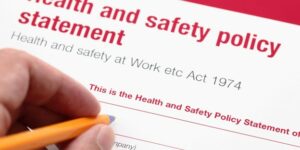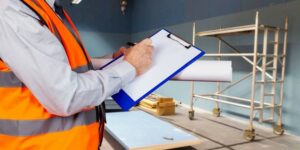28 Nov 2022 Using Due Diligence to Record, Investigate and Prevent Accidents at Work
In 2020/21, 441,000 workers sustained a non-fatal injury at work according to the Labour Force Survey conducted by the Health and Safety Executive. Sadly, a further 142 workers lost their lives due to workplace accidents. And with 1.7 million workers suffering from work-related ill health, Health and Safety at work is a huge issue for most UK businesses. And the sensible management of workplace risk is an essential part of business operations.
What is Health and Safety due diligence?
Health and safety due diligence means the level of judgement, care and responsibility an individual or organisation would reasonably be expected to have or carry out in order to prevent any incident or conditions resulting in harm to a person.
In terms of occupational health and safety, due diligence refers to all the reasonable precautions and actions an employer should take to prevent injury, accident or illness in the workplace.
There is a general health and safety legislation and guidelines as regulated and enforced by the Health and Safety Executive (HSE). In addition, many industries will be subject to specific legislation determining their health and safety responsibilities along with the potential consequences of non-compliance.
What can a lack of health and safety due diligence lead to?
In short, it can lead to vulnerability. Both in terms of health risks to employees and business risks to employers. Due diligence is not only the process businesses should undertake to prevent incidents in the first place, it’s also the defence that businesses would have in respect of any liability in the event of an accident or incident.
It isn’t enough to undertake the reasonable care, caution and action required to prevent an incident. It’s necessary to evidence due diligence in order to provide a legal defence, and also to validate professional and public liability insurance.
Undertaking a lack of due diligence can result in consequences like personal injury claims, refusal of insurance payouts, reputational damage and even criminal negligence action against business owners.
How do you demonstrate due diligence of Health and Safety responsibilities?

All the elements of a Health and Safety due diligence programme must be in effect to ensure your business has a watertight, inarguable due diligence defence in place. This involves keeping comprehensive records of the following:
- Health and safety policies, practices and procedures
- Evidence of how and when they have been communicated with staff members
- All risk assessments
- Details of actions taken to control or eliminate hazards as identified in risk assessments
- Robust accident and incident recording procedures
- Evidence of incident reporting decisions
- Evidence and analysis of all prior incidents/accidents and efforts to learn from and reduce such incidents
- Health and safety training records
- Agendas and minutes from any H&S relevant meetings
- Your business’ emergency response procedures
- Sampling and monitoring test results
- Forms and checklists for specific situations
- Personnel data regarding disciplinary actions and enforcement of health and safety procedures and policies
The above list is non-exhaustive, but is an example of the complexities of data management and exactly what is required to demonstrate health and safety due diligence. It is not enough, for example, to simple record accident and injury data in a database. This data should feature information like the frequency of that type of injury, and the cause and events leading to the incident so the business can analyse the data and build an appropriate response.
Inadequate data recording can lead to a failure to recognise patterns that signal a gap in the risk prevention strategy. Not noticing a cluster of events with similar aetiology could constitute a due diligence failure, and therefore may demonstrate liability
Due diligence recording is a thankless task – until you need to use it

Due diligence recording is a laborious process and one that is often rewarded only in retrospect. In the event that evidencing a due diligence defence is required, the work that has gone previously unnoticed will become of the utmost significance. Basically, you may never need to use a due diligence defence, but in the event you need it and you don’t have it, you’ll wish you could back peddle.
It is important to remember that due diligence can only be demonstrated when you can provide evidence that the proper actions took place prior to an incident taking place. Post-event, there’s very little that can be done to mitigate any failures in responsibility. No matter how prompt or appropriate your business’s response may be. Your actions after the event of an incident are irrelevant when establishing liability.
Find out how DUED can help streamline your due diligence process and offer your business the ultimate peace of mind. Find out more by emailing us at info@duedapp.com or calling 0800 999 1303.










